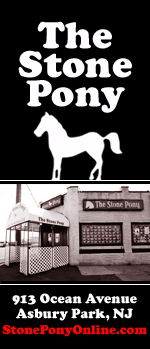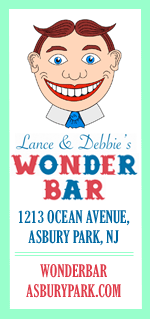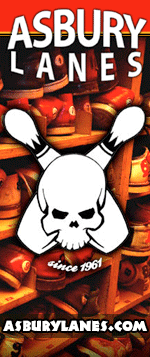
Scenes are a funny thing. Music has had countless different scenes bubble up over the years and spill their way in to the national spotlight, many of which are now spoken of in hushed tones of reverence. Others—most really—flicker out like a flare in the night sky. The psychedelic scene in the mid-to-late ’60s for instance, is held in higher regard than say, the largely forgotten American Legion scene of Ridgefield Park, New Jersey in 1993.
So what does all of this have to do with talk show hosts Ron and Gail Bennington? Well, anyone who has heard Ron Bennington on the radio, whether it was his early days on the “Ron and Ron” Radio Network in Florida, or the hugely popular “Ron & Fez” show in New York City during the dying days of the rock format at WNEW, or later in Washington, DC, or finally all over the world on Sirius XM, knows that music is something he can—and often does—discuss with the depth of a serious fan.
In 2014 Ron began the “Bennington” show with his daughter Gail Bennington who brought a fresh perspective and unique wit of her own and quickly showed she was not only more than capable of contributing to any of the wide spectrum of conversations the show veered into, but she could also carry them.
Initially airing sporadically on Fridays when Ron’s longtime on-air partner Fez Whatley retired in April of 2015, “Bennington” replaced the “Ron and Fez” show on Sirius XM’s Raw Dog Comedy channel in the 12PM-3PM slot. In October 2015 after years of talking intelligently about music, the Benningtons launched “GPS,” an hour-long show that features the music of one scene from a particular city.
Anyone who’s listened to you on the radio knows that music is a big part of your life, Ron. You’ve been in the radio business for a long time—why did now seem like a good time to start doing a music show?
RON: They asked. That was really it. We were doing the Bennington show on Opie Radio and we would use a different band as bumper music, and Gail and I would start discussing that, and then we got a call from management who basically said, “Hey, is there any way you guys would interested in talking about music and playing music?”
GAIL: It was already what we had been doing on those early morning shows. They were already kind of music heavy, but because we played a couple of tracks which usually either had a theme or would just focus on one artist—and we’d start it at the beginning of the show—it wound up being a music discussion that was usually fluid. People would call and that section of the show took off on its own.
RON: Yeah, it wasn’t supposed to. We would just be discussing different songs and people would call in and give their opinions and then people would call in and give their opinion against us. But what really got us started on this idea of GPS is not just the music but the scene that was around the music.
For cities like New York or London there’s so many different scenes you could focus in on, are you considering revisiting any of them?
RON: We will.
Was there pressure then to keep it just to an hour?
RON: They offered an hour and to have it directly promoted to our audience. Could we do these shows for four or five hours? We could, but we want to keep the emphasis on the music.
The Detroit episode stands out to me because it really highlights how diverse Detroit has been over the years even though that might not be the first place you think of with a diverse scene.
RON: Detroit actually got me interested once I’d seen the documentary about the Grande Ballroom, but also just thinking that the venue itself sets up what the music is going to be like—so it’s almost like the venue, the time, and the people around you set up what kind of music you’re going to be playing. If you played at CBGB’s in the 1970s, your sound was going to be different than if you happened to grow up playing in Laurel Canyon at the same time. You’re affected by a lot more things than you might have thought.
GAIL: Yeah venues and just the way the city operates in itself—we’re kind of seeing that as we go through each scene just how much that kind of stuff is part of the fabric that makes that time so important. Absolutely the venues kind of mirror what was capable—whether it was a smaller room like CBGB’s, you’re not going to fit in everyone so it makes it a very specific scene…who are the types of people who would have crammed themselves into a little room?
RON: Tight room, tight set, and out of that comes the Ramones.
Has it been hard to narrow down which bands or artists to include?
RON: Always. Always because you certainly don’t want to not to play the famous band who came out of the era but at the same time you want to find the right bands that someone listening goes, “Oh, I thought I knew this era but I missed this band or that band,” and every scene has that as well.
GAIL: The smaller, lesser known bands are harder to pick who belongs and who doesn’t with the time restraints, but the bigger bands are difficult in the way that you feel the need to define them. How do you define the Velvet Underground with one song? Or the Ramones with one song and is that the song that really represents that scene perfectly?
RON: (to Gail) Is that the most difficult thing for you? Do you sit down with a band that you love and you know you have to pick one song?
GAIL: Yeah and I think for that reason New York was one of the hardest for me because that’s the scene I love the most and so I felt this pressure to pick all the right tracks and make sure all the right bands were there. But a scene—like when we did London—there are so many bands…that was difficult, just pairing them back because we had such a wealth. But picking one song, specifically one song from a band that you love is difficult because it’s not always going to be your favorite song, but a song specific to the time or maybe one that inspired other bands that you can hear emulated afterwards. There’s definitely a pressure to pick the right one.
That’s part of the fun of the show—there are certain bands or acts you know are going to be played, but seeing which songs get picked and seeing how it fits as a piece into the whole.
RON: I’ve been thinking about it based on comedy from years ago—that Boston comics are different from New York comics who are different from L.A. comics—and sometimes you think it’s because it’s different parts of the country, but it also has to do with the people who own the club, stage time, and who was policing. “What kind of people are we? What kind of things can you do here? Maybe they get away with that in different parts of the country, but that shit doesn’t fly in Boston.”
Barry Crimmins was a guy who kind of set up certain ground rules of what it took to be a Boston comic that affects Boston comics today where they might not have ever met or even heard of Barry Crimmins and I think the same thing is true of music. Hilly (Kristal owner of CBGB’s) said you have to come in here and play your own stuff. Why he did that is crazy.
Yeah, a lot of places even back then were showcasing bands doing Top 40 stuff.
RON: And he actually forced it on those bands. And then if you look at the London scene, Mick and Keith hadn’t even thought about writing music until it came up that the Beatles were writing their own songs. They were happy enough to play covers of blues. They were just kids, but certain things force this creativity on people.
GAIL: And I think it’s cool that there are certain bands that you’re going to know where your influences came from, like the Stones and the Beatles, but I think it’s cool that there were bands that had so much influence that I’m not even sure most bands could tie it back to where the sound comes from. Like the MC5. I’m not so sure some bands could trace back “We sound like this because the MC5 existed.” So it’s cool to find those bands and give them a little recognition for getting the ball rolling.
As that Detroit episode was playing, I found myself thinking “Oh yeah, they’re from Detroit too” a few times it really illustrated what a big scene it was, and it was just a sliver of the total picture of everything that was going on at the time.
RON: That Detroit rock scene is so rich and so great but if you said “Detroit music” to people, 99% are going to say Motown and you can get why because that story has been told over and over, but at the same time that was happening you had Mitch Ryder going down, or young Alice Cooper, or the Stooges…just amazing.
Gail, when you were growing up were you into a lot of this music or did you find yourself rebelling against it and come back to it later—or did you hear at home all the time and get hooked?
GAIL: I think I’m the type of person who took the kind of music that was on in my house and that very much influenced the music that I like today. I think there were times that as I got older that I set off in little subgenres that were interesting to me and delved a little deeper into punk rock. I’d find my own way but the music my parents were playing in their house is still the music that’s on in my house.
RON: Yes and no—there were plenty of bands you introduced me to and you certainly climbed a lot deeper into the Staten Island punk scene than I would have.
GAIL: (Laughs) When I came to New York the ability to go see music on my own was incredible to me and then even more important was when some of the bigger bands were playing shows that were 18 or 21 and up and it forced you to go to local shows and see new bands. That was definitely something that was huge to me when I moved to New York City, being able to do that—and to be honest with you, going to record stores which I didn’t really have access to when I was younger, having that at your fingertips was really a big part of it for me.
That’s a perfect segue, leading me right to the vinyl questions. On Periscope you do a pre-show for GPS and there is always a big shelf full of records. Do either of you have a big collection? Do you still collect, or is it just something you’ve amassed over the years?
RON: For me vinyl wasn’t a matter of collection. When I was younger it was just life, but Gail has always collected.
GAIL: Yeah I started in high school when I moved to the city and I remember going to Generation Records and Sounds on St. Mark’s Place which is now closed, and I think my high school boyfriend at the time bought me a record player and from there I just never stopped. I collect records in that I buy them, but they’ve always been much more functional for me. I’ve never been trying to hunt down a first press or anything like that. If they play and if it’s a band I love or a band someone turned me on to, then I’ll pick it up. But I definitely was not the type of collector who was very particular about it—they’re very functional to me, I play them. It’s less of a collection and more of just the way I prefer to listen to music.
I think that is a large part of the comeback vinyl has made, maybe some of it is just collectors, but bands aren’t putting out new releases on CD as frequently as in the past. A lot of them are going the vinyl route and most new records come with a download card so you’re really covered on both ends.
GAIL: Of course there are a lot of record stores that closed down in the city that had been around, like I said Sounds and Kim’s Video and Music—that was a place where they had VHS, CDs, and records and those are dinosaurs now, but records—vinyl has kind of stuck around as something that I think will continue to get passed on and it’s had its resurgence. You’re going to find more record stores now in Brooklyn, but it’s funny to me that new record stores are popping up even though, maybe about 10 or 15 years ago, they were closing down.
RON: But don’t you think record stores are just a fun place to spend the afternoon in the same way that a book store is?
Absolutely.
GAIL: There’s a couple places I go to—Music Matters in Park Slope and 5th Avenue Record Shop—I could spend forever in those places. I passed a new one a few weeks ago, Black Gold Records in Carol Gardens, and I keep thinking I want to go back there. It’s a coffee shop, record store, and antique shop. They’re clearly into the aesthetic of it, they’re making it clear this is somewhere you’re going to spend some time. You’re not just going to pop in, you’re going to walk around with a coffee and spend the afternoon. That’s always my favorite thing to do when I go to a new town is to find their record shop and thumb through their dollar bins.
It’s a great way to find stuff that you might not have listened to otherwise, taking a chance on a $1 record.
GAIL: I have definitely bought records like that, you may know the artist or a few of their songs, but why would you not buy it for a dollar?
RON: I also like the fact that you find out what that time sounded like—we’re going to do Memphis and I thought that we were going to do a GPS that would start with Elvis and run into the soulful Memphis sound, but after fooling around for a while we might just stay 1950s. You can hear the world was a different place. You can pick that up just by listening.
Yeah I mean a lot of that stuff still has background noise or even mistakes on it and that’s something you lose with remastered versions where they clean it up so much you lose some of the authenticity.
GAIL: Yeah Memphis is one of those places where—what a crazy difference a decade makes in music. But then when we did London that’s a couple of years difference where the sound is so, so different.
RON: You get two or three years of one sound and then a totally almost new sound took over, but yet it was a lot of the same bands.
GAIL: And that has to be, of all the ones we’ve done, probably the most narrow in years that we covered because that sound, that garage rock, British-Invasion sound, that was such a specific time. There was so much and only a couple of years later things got trippy and psychedelic.
You could probably have done a few episodes just on the last half of that decade.
RON: Absolutely—we plan on going back to London for certainly the late ’60s. But the San Francisco sound was the same way too, where the real meat of that sound came from only just a couple of years—same with CBGB’s.
So Memphis is going to be the next GPS?
RON: Yeah we think Memphis but we’re also looking at LA. We just send songs back and forth to each other all the time but once I heard, and I hadn’t heard it in a few years, I put on “Rocket 88” and I was like “Wow, I think everything started here,” you know? It’s just always that amazing thing that you just hear one song and you go “Oh” and that moment is almost like a seed for everything that grew out of it. And it’s such a fun show to do and particularly to do it on Deep Tracks because you can actually play deep tracks—that makes it so much fun.
“Bennington” airs Monday thru Friday 12PM-3PM EST on Sirius XM’s Raw Dog channel and replays at 12AM-3AM on Opie Radio. The all new Memphis “GPS” airs on Sirius XM’s Deep Tracks.









